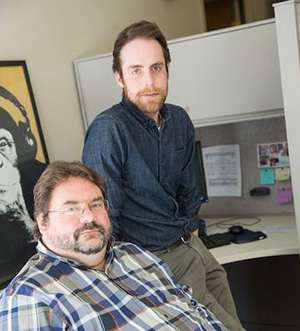Psychologist finds link between PTSD and prison

Americans who spend time in prison are nearly twice as likely to suffer post-traumatic stress disorder than those who don't, according to a new study by UWM psychology professor Shawn Cahill and his graduate students.
The team used data from a series of surveys collectively called the National Survey of American Life to study PTSD. Their research was recently published in Criminal Behavior and Mental Health. Cahill and graduate student Tim Geier explained their research and what they found.
How did you use the data to find a relationship between PTSD and prison?
Shawn Cahill: The survey-takers did representative sampling of the entire United States with a series of formal questions that asked about various mental health issues.
For the African American sample, they specifically added questions about incarceration. We didn't have access to incarceration questions for other groups, unfortunately. The surveys asked about lifetime prevalence of various mental illnesses, and then past-year (occurrences). Basically, our PTSD variable is a simple yes or no. It's not a severity issue.
And you found that people who had been imprisoned were more likely to report having PTSD?
Cahill: Yes. None of these people are currently incarcerated. Everything that we have is looking back, and we don't have information about where the symptoms were relative to the incarceration. Did they start before the incarceration, during the incarceration, or after?
It could be that PTSD existed before they went to prison and it might be a risk factor for incarceration. It could be that they were assaulted while incarcerated and developed PTSD because of that experience, or it could have developed after release.
Tim Geier: But there certainly is a relationship between incarceration and PTSD. People may experience car accidents, a sexual assault or a physical assault, but being in prison is the factor that makes it more likely that you'll have PTSD in your lifetime. Even adjusting for some really important variables, like the number of traumas you've experienced in your life, the relationship still holds.
Cahill: Of those who had a history of incarceration, about 13 percent had PTSD compared to just under 8 percent of those without a history of incarceration. The vast majority of folks didn't have PTSD. That was looking over peoples' lifetimes.
What are the criteria for being diagnosed with PTSD?
Cahill: You have to experience an event that involves the actual or threat of harm to yourself or someone else. It could be that it happened directly to you or it could be that you witnessed it happen to someone else. It could be that you learned about it – for example, if I learned that my uncle committed suicide.
Given that kind of event, you would have to have symptoms like intrusive thoughts about the event – nightmares, flashbacks, emotional responses and physical responses triggered by the memory of the event. Then there are avoidance and numbing symptoms, like avoiding thinking or talking about the trauma or avoiding reminders that would trigger thought about it. You could lose interest in most activities, feel numb in certain circumstances that would call for a strong emotion. Other symptoms involve hyper-arousal, so feeling on-guard or vigilant, being easily startled or having outbursts of anger or irritability that are greater than before the event.
Why should the general public care about this research?
Cahill: We know that PTSD is associated with all kinds of problems – increased risk for violence, increased risk for suicide, underemployment, unemployment, health problems and substance abuse.
It hits home given that Milwaukee in particular has extremely high rates of incarceration among African American young men.
Is there any way to address PTSD people who have been in prison?
Cahill: Yes. The good news is, we made progress in the '80s and '90s in terms of establishing treatments that work. We have options in terms of medication and psychotherapy. In the past decade or so, we've made progress in terms of making sure that within the Veterans Affairs system and the Department of Defense that veterans and active-duty soldiers have access to two forms of Cognitive Behavior Therapy, which is the most researched treatment for PTSD.
But outside of the VA system, most therapists are not trained in empirically supported treatments for PTSD. So there's work to go there.
















